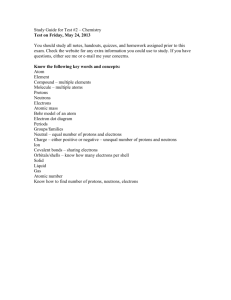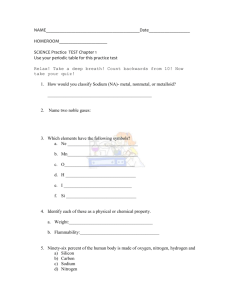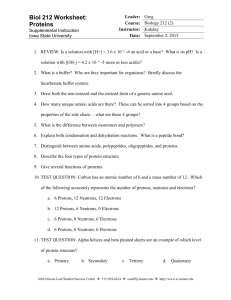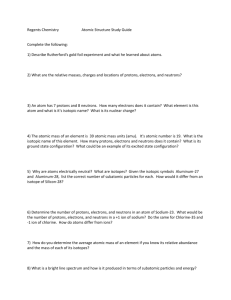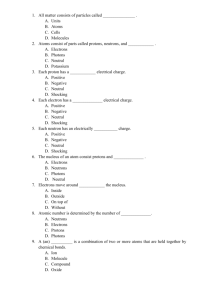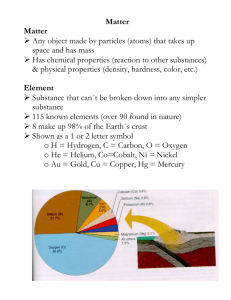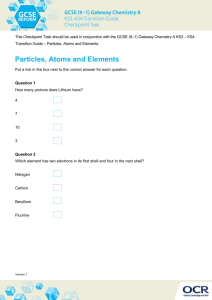Atomic Dating Game
advertisement
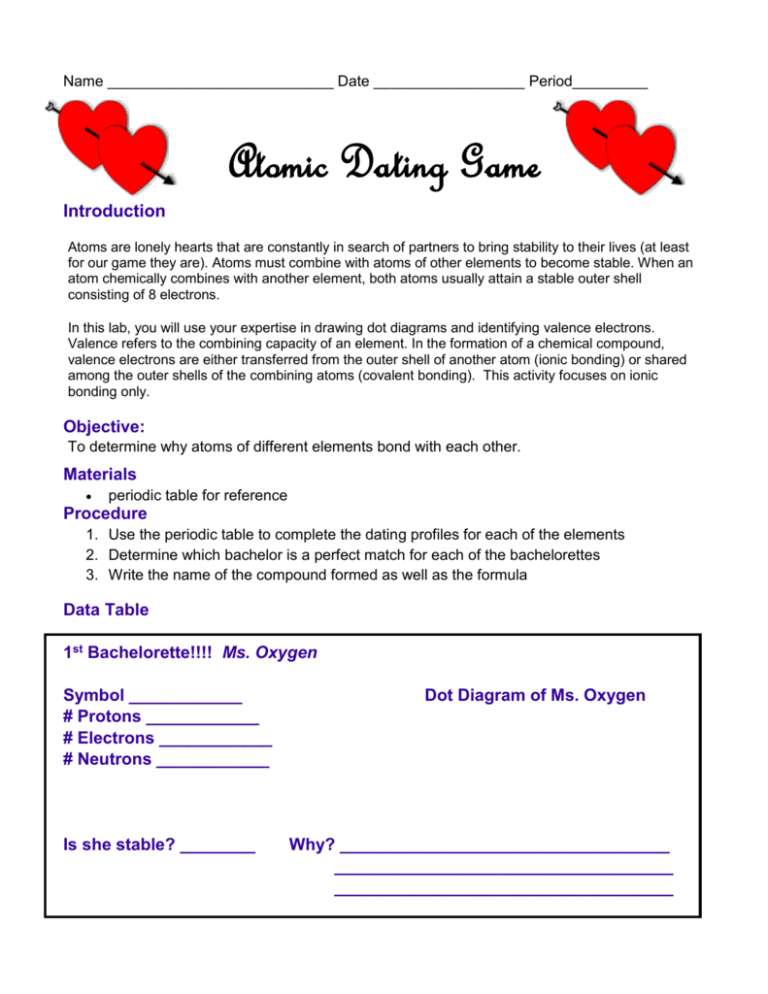
Name ___________________________ Date __________________ Period_________ Atomic Dating Game Introduction Atoms are lonely hearts that are constantly in search of partners to bring stability to their lives (at least for our game they are). Atoms must combine with atoms of other elements to become stable. When an atom chemically combines with another element, both atoms usually attain a stable outer shell consisting of 8 electrons. In this lab, you will use your expertise in drawing dot diagrams and identifying valence electrons. Valence refers to the combining capacity of an element. In the formation of a chemical compound, valence electrons are either transferred from the outer shell of another atom (ionic bonding) or shared among the outer shells of the combining atoms (covalent bonding). This activity focuses on ionic bonding only. Objective: To determine why atoms of different elements bond with each other. Materials periodic table for reference Procedure 1. Use the periodic table to complete the dating profiles for each of the elements 2. Determine which bachelor is a perfect match for each of the bachelorettes 3. Write the name of the compound formed as well as the formula Data Table 1st Bachelorette!!!! Ms. Oxygen Symbol ____________ # Protons ____________ # Electrons ____________ # Neutrons ____________ Is she stable? ________ Dot Diagram of Ms. Oxygen Why? ___________________________________ ____________________________________ ____________________________________ Here are 3 “eligible” Bachelors!!! Ms. Oxygen must choose one….who will it be??? Bachelor #1 Mr. Carbon Symbol ____________ # Protons ____________ # Electrons ____________ # Neutrons ____________ Is he a match? ________ Bachelor #2 Dot Diagram of Mr. Carbon Why? ___________________________________ ____________________________________ ____________________________________ Mr. Sodium Symbol ____________ # Protons ____________ # Electrons ____________ # Neutrons ____________ Is he a match? ________ Bachelor #3 Dot Diagram of Mr. Sodium Why? ___________________________________ ____________________________________ ____________________________________ Mr. Magnesium Symbol ____________ # Protons ____________ # Electrons ____________ # Neutrons ____________ Is he a match? ________ Dot Diagram of Mr. Magnesium Why? ___________________________________ ____________________________________ ____________________________________ Write the NAME of the compound and its FORMULA _________________________________________________________________ Now let’s meet our 2nd Bachelorette!!!! Ms. Potassium Symbol ____________ # Protons ____________ # Electrons ____________ # Neutrons ____________ Is she stable? ________ Dot Diagram of Ms. Potassium Why? ___________________________________ ____________________________________ ____________________________________ Here are 3 “eligible” Bachelors!!! Ms. Potassium must choose one….who will it be??? Bachelor #1 Mr. Silicon Symbol ____________ # Protons ____________ # Electrons ____________ # Neutrons ____________ Is he a match? ________ Bachelor #2 Dot Diagram of Mr. Silicon Why? ___________________________________ ____________________________________ ____________________________________ Mr. Fluoride Symbol ____________ # Protons ____________ # Electrons ____________ # Neutrons ____________ Is he a match? ________ Dot Diagram of Mr. Fluoride Why? ___________________________________ ____________________________________ ____________________________________ Bachelor #3 Mr. Neon Symbol ____________ # Protons ____________ # Electrons ____________ # Neutrons ____________ Is he a match? ________ Dot Diagram of Mr. Neon Why? ___________________________________ ____________________________________ ____________________________________ Write the NAME of the compound and its FORMULA ______________________________________________________________ Analysis 1. One of the bachelors in the data was kicked off the show for being married. Who was he and how do you know he was married? _______________________________________________________________________ _______________________________________________________________________ _______________________________________________________________________ 2. Find a perfect match for the following atoms: a. Mr. Chlorine _________________________________________ b. Mr. Potassium _______________________________________ c. Ms. Xenon __________________________________________ d. Ms. Beryllium ________________________________________ 3. What is an ion? Why do you think that these types of bonds are called ionic bonds? _______________________________________________________________________ _______________________________________________________________________ _______________________________________________________________________ _______________________________________________________________________ _______________________________________________________________________ 4. When atoms form ionic bonds, which types of elements give their electrons away, and which ones take them (metals/nonmetals/metalloids)? _______________________________________________________________________ _______________________________________________________________________ _______________________________________________________________________ 5. Give the chemical formulas of the following ionic compounds: a. Potassium Sulfide ___________________________ b. Magnesium Chloride _________________________ c. Ammonium Carbonate _______________________ d. Aluminum Phosphate ________________________ Conclusion The conclusion section needs to have four sentences: 1st sentence: Repeat the objective 2nd sentence: Describe what you did specifically in the lab to achieve the objective. 3rd sentence: Share what you learned. 4th sentence: This is a general summary of the lab. It ties into the first sentence of the purpose. ______________________________________________________________________ _______________________________________________________________________ _______________________________________________________________________ _______________________________________________________________________ _______________________________________________________________________ _______________________________________________________________________ _______________________________________________________________________ _______________________________________________________________________ _______________________________________________________________________ _______________________________________________________________________ _______________________________________________________________________ _______________________________________________________________________ _______________________________________________________________________ _______________________________________________________________________ _______________________________________________________________________ _______________________________________________________________________ _______________________________________________________________________

